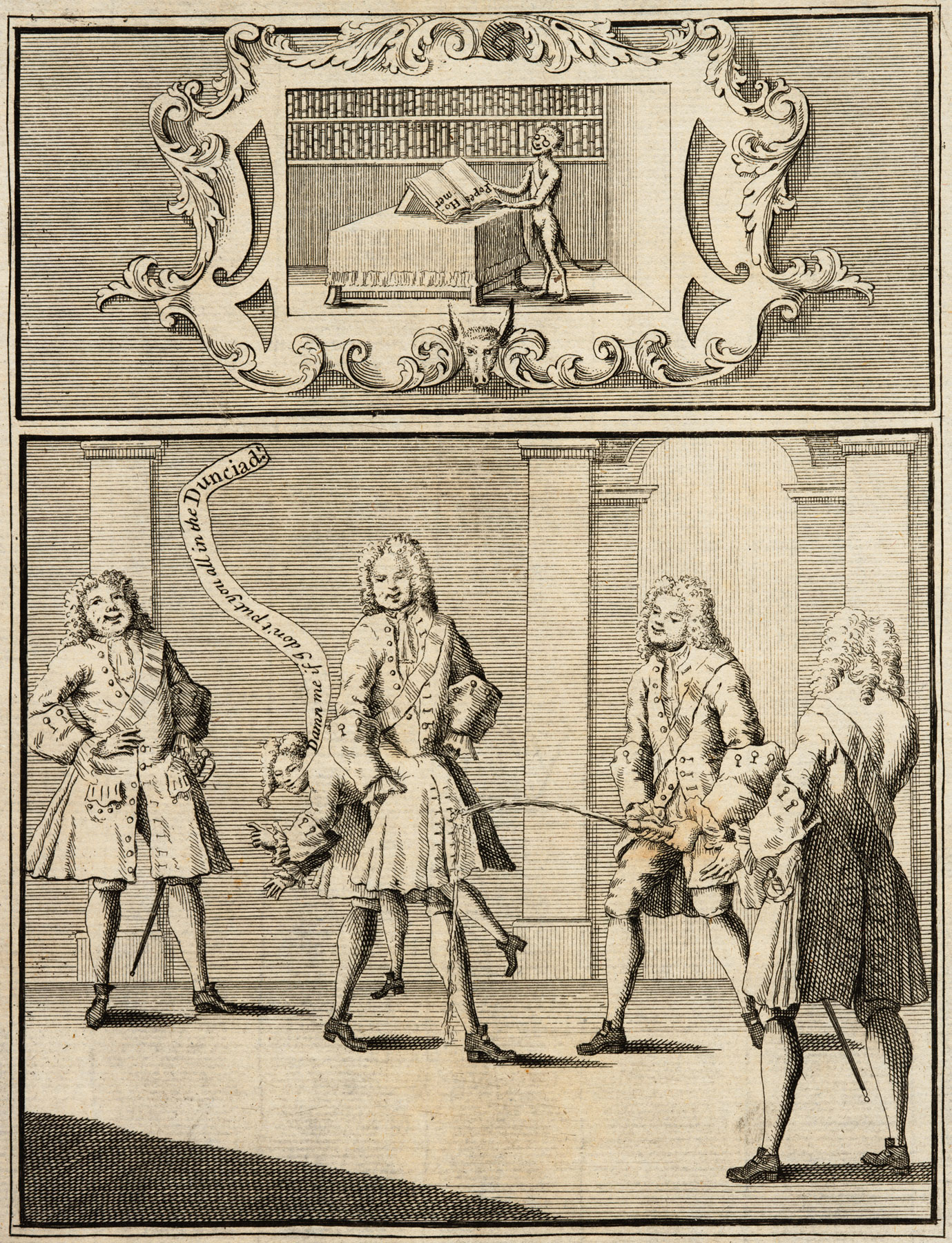
Frontispiece to Ingratitude; to Mr Pope
by an unknown artist
1733
Courtesy of the Huntington Library (Call number 139759)
Frontispiece to Ingratitude: to Mr. Pope. Occasion'd by a Manuscript Handed About, under the Title of, Mr. Taste's Tour from the Land of Politeness, to that of Dulness and Scandal, &c. &c. (London: printed and sold by J. Dormer, 1733). A nobleman holds a struggling Alexander Pope at the hips while another urinates on his backside; a third stands to the left, laughing, while a fourth on the right observes. Pope cries out "Damn me if I don't put you all in the Dunciad!"
Beneath the image, the text reads:
Maevius, thou worst of Men (if Man thou art)
Thou Syren Charmer, with a Daemon's Heart:
To Vice indulgent, Virtue you pollute,
And prey, like Wasps, upon the fairest Fruit.
"Worthy 'Squire," the pamphlet begins, accusing Pope of having authored Mr. Taste's Tour, which would appear in print two days later:
I am inform'd, that there is in the Press, and in a few Days will be publish'd, a satirical Poem, or rather a Libel, on several Noblemen, of which (as it is said) you are the Author: The great Personages whom you therein most falsely calumniate, if you are really the Author, have a Design, as I am inform'd, to truss you by turns under one of their Arms, and then, by lowering your Worship, to piss upon you as an Insect beneath their Resentment any other way: Nor can you deny that you deserve such Treatment. And here I must observe by the bye, that your Satirical Pieces, as you are pleased to call them, are mere Defamatory Libels; for he that transgresses the Rules of Satire, whose Business is to expose and lash Vice with Severity, falls at once, either through Ignorance, or Wilfulness, into Defamation, whose scandalous Office is to attack and blacken the Reputation of Persons, though undeservedly. (3)
The pamphlet falsely charges Pope with spiteful ingratitude, particularly to the Duke of Chandos who had given him £500, and claims that Pope's "Infamous and Scandalous Satire" was "calculated, with all the Malice and Virulency imaginable to Defame and render Odious the Character of his best Benefactor" (7–8). The pamphlet goes on to accuse Pope of pretending to be Joseph Addison's friend only until "that good, that moral, and Christian Man's death," whereupon he wrote "a most virulent Satire against him" (8). Probably Ingratitude and Mr. Taste's Tour were both written to capitalize on the Chandos scandal (in which Pope had been deeply embarrassed by the unjust accusation that the ostentatious Timon's villa, a fiction representing false taste in Epistle to Burlington (1731), was actually Chandos' Cannons). Although it may have simply been another attack on Pope, Ingratitude may have been written to help make the deception concerning his authorship of Mr. Taste's Tour more convincing (J.V. Guerinot, Pamphlet Attacks on Alexander Pope 1711–1744, 237).
Pope's tiny stature here makes him appear childlike and ineffectual, while the size of his tormenter's semi-erect penis, longer than Pope's head and needing two hands to grip it, insults Pope's masculinity as both man and writer (Raymond Stephanson, The Yard of Wit, 206–7). In the tableau above, a monkey-like creature probably represents Pope himself (recalling the "A.P—E" depicted on Duckett and Dennis' pamphlet of 1729), as the "certain remarkable two-leg'd Animal" who in earlier days would have had "his Neck stretched somewhat longer than it is at present, and die the Death of a Dog" (Ingratitude 6), "the certain Animal, of a diminitive Size, who had translated a Book into English-Metre, (or at least had it translated for him)" (7). Here in his library, dwarfed by the folio open before him and—though naked except for a baldrick without a sword—seeming to lack genitalia entirely in contrast to his tormenter in the panel below, he betrays his ignorance as he pretends to read his own translation of Homer unaware that the book is turned upside down.
Pope had been the subject of such hostile and abusive pamphlet attacks since John Dennis' Reflections Critical and Satyrical was published in June 1711, wherein Dennis had cruelly portrayed Pope as a venemous, stupid, and impotent "hunch-back'd Toad." For decades afterward Pope's detractors would launch contemptible attacks on his manhood, his learning and scholarship, his supposed Jacobitism, and his diminutive size and deformity. Pope had lashed back in The Dunciad (1728) and Dunciad Variorum (1729), characterizing numerous foes as dull and foolish dunces, and had included in the Variorum "A List of Books, Papers, and Verses, in which our Author was abused, before the publication of the Dunciad: With the true Names of the Authors." Pope's threat to put the names of these laughing bullies in The Dunciad is clearly intended to show the ineffectuality of his bravado, readily dismissed by larger, stronger men, but the long-lived and virulent pamphlet wars showed that Pope's words were not taken so lightly by his enemies.
—by Allison Muri, April 2014
The image file displayed on this page is stored on the Grub Street Project server, courtesy of the Huntington Library. Permission to reproduce images or texts of materials owned by The Huntington is granted when the use of the materials in publications, in any format, conforms to the terms specified in its Permission to Publish Policy.